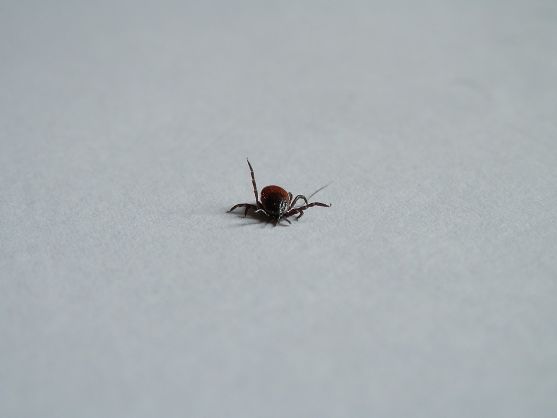Ticks pose a threat to your health and fleas are a nuisance. From the natural landscape in Chester County and the woods and open fields in Montgomery County, the environmental conditions, wildlife and pets can lead to an infestation of these pesky and potentially harmful critters.
If you live in Pennsylvania, you’re well aware of tick season (when the temperature is above 50 degrees) and the risk to your family and pets from ticks. These little beasts carry a disease that can severely impact the quality of life for those who are bitten – Lyme disease. Most of the ticks that transmit Lyme disease are commonly called “deer ticks”. Children are the most at risk for being host to ticks since they are playing in wooded or grassy areas more than adults.
Fleas move inside your home on pets or humans. They usually multiply rapidly and can quickly infest carpets and upholstery. Homeowners may have to resort to treating the house if an infestation is present.
How Ticks Spread Lyme Disease
Lyme disease is spread through the bite of infected ticks. (Ticks are born without this disease. However, they are infected by taking a blood meal off a small mammal, a mouse or chipmunk). Typically they move around on a host animal and when they have finished feeding they drop off and wait for a new host, either an animal or person to brush against them and pick them up. In general, ticks need to be attached for 36-48 hours before they can transmit Lyme disease bacteria.
Most humans are infected through the bites of immature ticks called nymphs. Nymphs are tiny (less than 2 mm) and difficult to see. Adult ticks can also transmit Lyme disease bacteria, but they are much larger and more than likely to be discovered and removed before the bacteria is transmitted.
The risk of exposure to ticks is greatest in the woods and in the edge area between lawns and woods; however, ticks can also be carried inside by pets.

Mice and other small mammals are hosts to ticks and contribute to the spread of infected ticks.
How to Protect Yourself
• Wear light-colored clothing so that ticks can be spotted more easily.
• Wear long-sleeved shirt and pants.
• Spray insect repellent containing DEET on clothes and exposed skin (not the face)
• After being outdoors, remove clothing and inspect body.

Wood piles attract wildlife that host and transport ticks.
How to Remove a Tick
• Use fine-tipped tweezers to grasp the tick as close to the skin’s surface as possible.
• Pull upward with steady, even pressure to remove the tick. Don’t twist or jerk. Flush it down the toilet.
• Clean the bit area and your hands with rubbing alcohol or soap and water.

Remove leaf debris and brush from perimeter of yard.
Make Your Property Less Attractive to Ticks
The goal is to reduce the amount of tick habitat. A few Landscaping Management Techniques are:
• Mow frequently and keep grassy areas free of leaf debris.
• Remove tall grasses and brush from around the property.
• Keep wood piles and feeders away from popular areas. These spaces attract wildlife that host and transport ticks.
• Keep swing sets at least 10 feet from wooded edges.
• Utilize hardscaping (patios and decks) to the fullest since ticks are unlikely hanging out on these surfaces.

Wildlife and even pets contribute to the infestation of these pesky critters.
Symptoms of Lyme Disease
• A bull’s eye shaped rash at the site of the bite that appears about a week later.
• Flu like symptoms
• Severe headaches and neck stiffness.
• Arthritis with severe join pain and swelling, particularly in the knees
• Irregular heartbeat
• Nerve pain
What Whitehouse Landscaping Can Do to Help Minimize Your Exposure to Ticks
One way we can decrease your chances of being bitten is by applying a barrier in your lawn where your children and pets play. Whitehouse Landscaping offers a 5-application service throughout the warmer months. The service is provided every 3 -5 weeks which helps reduce the flea and tick population on your property. Property perimeter and landscape areas are treated. The cost of our surface insect control is based upon the square footage of your lawn.
Conclusion
Now that you have a basic understanding of the transmittal and prevention of ticks and the disease they carry, it’s smart to implement these tips with either professional help or the very least, practicing some basic landscaping management techniques as mentioned above.
Servicing Chester, Montgomery and Berks Counties, Whitehouse Landscaping can help you with your landscaping needs. Check out our website for all our services.

